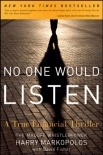No One Would Listen: A True Financial Thriller, Harry Markopolos [graded readers .TXT] 📗

- Author: Harry Markopolos
Book online «No One Would Listen: A True Financial Thriller, Harry Markopolos [graded readers .TXT] 📗». Author Harry Markopolos
There is no prescribed way to tell someone you’ve discovered one of the largest frauds in history. “Ed, I’ve got something really serious I need to talk to you about,” I began. “I discovered this huge scheme; I’m not sure if this guy is front-running or if it’s a Ponzi scheme, but whatever it is, it’s bigger than anything you can imagine—unbelievably huge. He’s running the largest hedge fund in the world, although no one knows about it because it’s run so secretly, and the whole operation is some kind of fraud.”
In his typically understated manner, Ed replied, “That sounds rather serious, Harry. When can you bring it in?”
I knew I had to prepare a detailed report, laying out my strongest case in a way even an SEC lawyer could understand. “I might need a few more weeks to prepare,” I said.
“Just let me know when you’re ready and I’ll schedule a meeting.”
There. It was done.
I spent quite a few nights over the next few weeks preparing this first written submission, which would reinforce the points I intended to make during my oral presentation. I put a lot of effort into it, knowing I was about to attack one of the most powerful men on Wall Street. It was pretty obvious that a portfolio manager at a midsize Boston firm shouldn’t pick a fight with someone like that unless he had some powerful weapons. This was my weapon. In the end it was only eight pages long, including the Broyhill All-Weather Fund “Manager B” exhibit. It didn’t seem like much, considering I was trying to take down a giant, but it was what I had. My expectation was that my detailed explanation of Madoff’s operation, accompanied by this presentation, would put the SEC on his trail. It would have to initiate its own investigation, and I was totally confident the SEC would reach the same inescapable conclusion we had. After listening to what I had to say and reading this material, I figured they would have to be complete fools not to realize I was handing them the case of a lifetime.
Who knew?
The report began, “In 25 minutes or less, I will prove one of three scenarios regarding Madoff’s hedge fund operation: (1) They are incredibly talented and/or lucky and I’m an idiot for wasting your time; (2) the returns are real, but they are coming from some process other than the one being advertised, in which case an investigation is in order; or (3) the entire case is nothing more than a Ponzi scheme.”
As I explained, “My firm’s marketing department has asked our investment department to duplicate Madoff’s ‘split-strike conversion’ strategy in hopes of duplicating their return stream. We know from bitter experience that this is impossible.... I would like to prove Madoff’s a fraud so I don’t have to listen to any more nonsense about split-strike conversions being a risk-free absolute return strategy.” I added, “If there is a reward for uncovering fraud, I certainly deserve to be compensated. There is no way the SEC would uncover this on their own.” I did add that my firm did not know I was making this submission and I did not want anyone to know I was doing it, a reasonable request for a whistleblower to make, and that I had not traded on the information I was presenting.
I assumed this would be the only submission I would have to make to the SEC. I included six red flags, as I described them, taken directly from the Broyhill material, that individually would raise serious questions about the legitimacy of the hedge fund, but taken together made it clear that the whole operation was a fraud. The first red flag explained that if Madoff was using a split-strike strategy, his reported returns could not come from the performance of the market. Second, there were not enough options in existence to provide the hedging he claimed as part of the strategy. Third, the performance chart rising at roughly a 45-degree angle doesn’t exist in finance. Fourth, his reported returns couldn’t come from the market performance or options hedging, but there was no indication of where they did come from. Fifth, Rampart’s returns from products similar to Madoff’s had been substantially less than those claimed by Madoff. As I wrote, “In down months, our ... program experienced losses ... whereas Madoff reports only 3 losing months out of 87, a claim I believe impossible to obtain using option income strategies. In August 1998, in the midst of the Russian default and the Long Term Capital Management twin crises, the S&P dropped 14.58 percent, yet Madoff earned 0.30 percent. In January 2000, the S&P 500 dropped 5.09 percent, yet Madoff earned 2.72 percent. Our current test portfolios do not support this....” And the sixth red flag specifically noted that while the market had 26 down months in the 87-month period presented, Madoff had only 3, and “the methods given for the return generation are not possible or even plausible. Obviously there are not enough





Comments (0)